KILKENNY — For most Americans, the Fourth of July is a celebration of the country's founding and self-declared separation from the British empire. For members of the Rainbow Family of Living Light, the Fourth is a sacred day of prayer for peace and the pinnacle of their annual nationwide gathering.
For the first time in its 52-year history, the Rainbows chose the White Mountain National Forest as the site of their gathering, just outside Berlin. The location's small size and remote nature resulted in a lower estimated turnout of around 2,200 people. Last year's gathering in Colorado allegedly had 10,000 participants.
The Forest Service requires that groups of 75 people or more apply for a special use permit. However, the Rainbow family has no leaders, no ranks, or requirements for membership, and thus there is no one to apply for a permit. The Rainbow Gathering happens without a permit, but that hasn't stopped organizers for 50 years. The size of the gathering prevents the Forest Service from banning it, which leads to a relationship of confrontation and shaky cooperation between the Rainbows and the Forest Service. The service sometimes deploys advisors to assist Rainbow with setup and cleanup efforts to mitigate damage to natural resources, but also uses a 50 officer incident management team to conduct traffic stops and searches for contraband. This year was no exception, with 116 violations.
Despite the frequent traffic stops, many of those cars, micro-buses and vans arrived at Kilkenny Loop Road, where their occupants made the trek out to the gathering site. Early arrivals were able to park close to the muddy trail that led to the main meadow, while late comers like The Daily Sun had to hike a mile or more before reaching the path to the temporary utopian city of nearly 2,000 inhabitants.
Rainbow's leaderless and open membership leads to a somewhat organized chaos throughout the event in the form of free kitchens, drum circles, workshops, dances, healing rituals, free expression and light substance use as members of major world religions, hippies, anarchists and other various counter-culture groups converge.
There is no money exchanged for goods and services at Rainbow, at least in the traditional sense. Anyone can go to one of the many kitchens for food, although they may be asked to exchange some labor for their meal, or contribute by laying pipes for water use or digging latrines. There is a “magic hat” passed around at communal meals for monetary donations used to pay for ingredients and other supplies, but tithing — like clothing — is optional at Rainbow.
Instead of fireworks and displays of patriotism, members spent the morning of July 4 in silence, praying and meditating for world peace. Prior to noon, attendees gathered in a dedicated meadow, holding hands, and finished the prayer with “Om,” a chant rooted in Tibetan Buddhism and commonly encountered throughout new-age spiritual movements and yoga studios across modern America. Then the party started.
The center meadow quickly became a dancing sea of rainbows, floral patterns and bare flesh moving to a chaotic cacophony of drums, flutes, penny whistles, xylophones, trumpets and other instruments. Beneath the dancers, dogs and children wandered freely. On the outer edges of the core dance group, attendees strummed guitars, chatted, or sat in the grass. In the forest, food was cooked in the kitchens, workshops were conducted and people congregated.
All kinds of people could be found among the crowd, including a group of Orthodox Jews from Brooklyn.
“Part of our religious life in Judaism, we strive for a world of unity, we call upon the Messiah,” said Jacob Desser, a member of the group. “Taking a part in this in order to get a microcosm of what Messiah really looks like, when there is unity, peace, tranquility and everyone gets along, and the pure intention.”
This was Desser's first Rainbow gathering, but he said members of the Orthodox community have been attending the event for over two decades. For those early attendees, Rainbow was a way they could keep their faith, and still find wider acceptance.
“Jews who came to Rainbow initially back then felt like they were lacking a sense of belonging, because many had gone through different journeys, where a lot of them were judged in the way they have conducted their lives within some of the Orthodox communities,” Desser said.
Throughout the festival, there are few cellphones visible to document the event. Most attendees are immersed in the moment. Alcohol was also notably absent, as its consumption is heavily discouraged.
On the outskirts of the crowd stood New Hampshire's perennial presidential candidate, Vermin Supreme. He sported a full beard as well as his trademarked rubber-boot hat and gigantic toothbrush.
“I'm happy to see it, and I think the Rainbow Gathering is a beautiful example that people need to experience. They need to see and understand what it is,” Supreme said. “We attract all sorts of people from across the political and socioeconomic spectrum. Sure most of them are hippies, I'll give you that, but I'm really happy that worlds are colliding, as it were.”
Supreme has participated in Rainbow since 1986, and boasted he and his wife once had a 20-year stretch where they attended consecutively. He credited Rainbow as essential to shaping his ideology, political style and performance.
“The cooperation that works here is amazing,” Supreme said. “This is where I learned, politically, anarchy, because I am a left anarchist. I believe in mutual aid, I believe in people helping people, and this event is where I learned those things.”
“My worst enemy at Rainbow is better than my best friend in the real world,” Colt Armstrong said as he lay in the grass with his family. Armstrong first heard of the Rainbow gathering from his friend Nomadd on a trail in his home state of Texas.
“He stole my van two days before Christmas,” Armstrong recalled. “I forgive him. Took awhile, though.”
Dasha Pechurina, a young woman from North Carolina, sat a few dozen yards away from the Armstrongs with a collection of clothes and jewelry laid out neatly on a blanket.
“We have a different economy here,” Pechurina said. “I found that things that are worth a lot to me might be worth less to another person, and vice versa. Something that's not special to me might mean the world to another, so the trades end up being so interesting and illuminating of each person's soul.”
This was Pechurina's third Rainbow Gathering, and her first time in New Hampshire.
“It's really gorgeous,” she beamed. “I've never really been able to swim in the river at Rainbow Gathering [before]. The abundance of water here is really magical.”
That abundance of water was attributed to frequent rain. That, combined with the heavy foot traffic along the spiderweb network of trails, resulted in thick, sticky mud that hampered travel, but not spirits.
From Pechurina's view, the rain just brought the community closer, into what was already a more intimate gathering due to the lower number of attendees.
“We all love each other and support each other and the rain has allowed people to show up in these really powerful ways with building structures, the tents, keeping fires, just keeping the whole thing going, it's been a lot,” Pechurina said. “And people are showing up and doing it and it's bringing our family closer together.”
The Rainbows trace their origins back to 1972. According to their own legend, a group of Vietnam veterans looking to escape the PTSD-triggering explosions of fireworks took to the Colorado woods during the Fourth of July. They were joined by anti-war hippies and peaceniks.
“It was the union of those two groups. We didn't even think of it as a union, it was just, 'I was a peacenik, you were a vet, and now we're all working together because we share the same vision,'” said longtime Rainbow family member Garrick Beck. “So how did these space angel American psychedelic hippies manage to land in the woods and take care of themselves? There was a lot of coordination to the demonstrations, and these people coming back from military assignments overseas. We had our act together to make water, food, fuel, medicine: community.”
That tradition of community-building and coordination is still present five decades later. Along the multi-mile walk to the main village, The Daily Sun passed multiple kitchens, filtered water fill-ups, a small stage for talent shows and even an ambulance, painted with the words “Fambulance” on the side in blue.
A yellow sign pointed to trench-style latrines. One participant who helped with setting up the water supply guessed there were at least 10 miles of pipe installed throughout the area.
As the afternoon rolled on, the drum circle shrank and temporarily dispersed. Members gathered and formed two lines facing each other to conduct what they call an angel walk. A thin, ponytailed man slowly beat a hand drum as the crowd broke into a hymn-like song, chanting “child of the earth, you are loved.”
Participants walked slowly between the two lines. Those who wished received embraces, shoulder rubs and other forms of gentle contact from complete strangers. In addition to touch, participants were inundated with words of kindness, affirmation and encouragement. Many broke down into tears before making it through to the end. As the participants finished, they joined the line to pay the ritual forward.
“It is very likely that what we have been taught about unconditional love is wrong,” said Desser, who participated in the ritual. “When you go through, you realize what true unconditional [love] really feels like. The energy is just so powerful. It's unmatched, honestly.”
Such a practice is so rare in the outside world, what Rainbows call “Babylon,” that "regular" folks might bristle or balk upon witnessing it. But in an era where human-to-human interaction is becoming increasingly rare, perhaps such practices are needed more than ever.
As night fell, many dispersed back to their tents and kitchens. Others attended a talent show at the miniature Granola Funk Theater. The drum circle dwindled, but did not die. Drummers and dancers played well through the night around a sizable and orange fire.
In the early morning, as the kitchens lurched back to life and The Daily Sun packed up to return to Laconia, the drums were still beating. There were only three more full days left of Rainbow, before everyone but the cleanup crew would disperse to their various corners and circles across the country.
“Why is it that this group of fringe elements of society — poets, Bohemians, woods bunnies, urban activists — why is it that this group can see that everybody here has food, some shelter and some medical care, and the giant establishment of the world cannot put a peanut butter and jelly sandwich and a glass of clean water in the hand of every child on Earth?” asked Beck. “That's my question.”






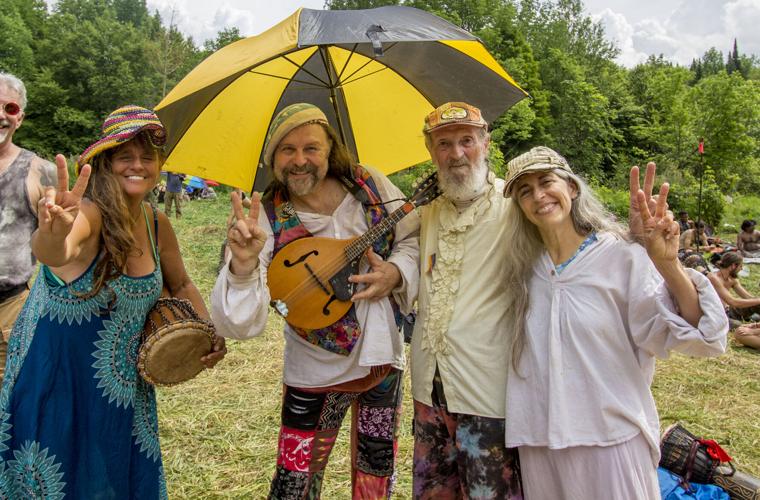
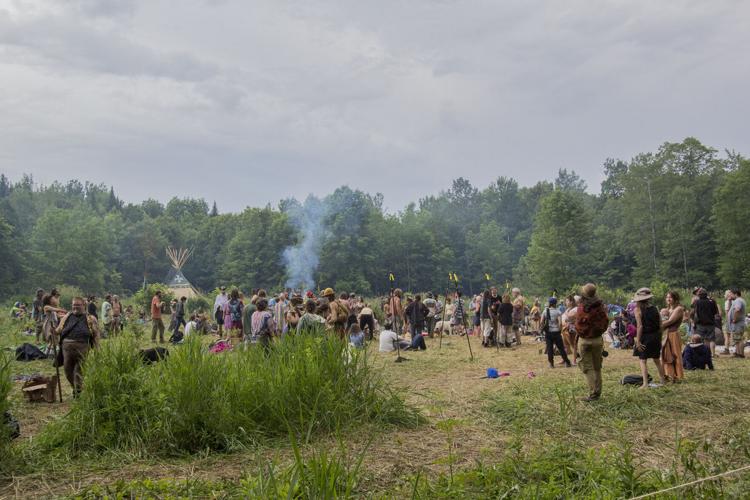
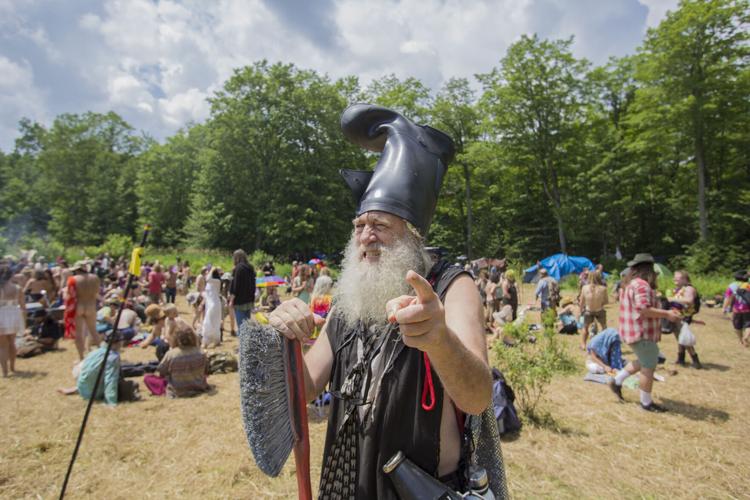
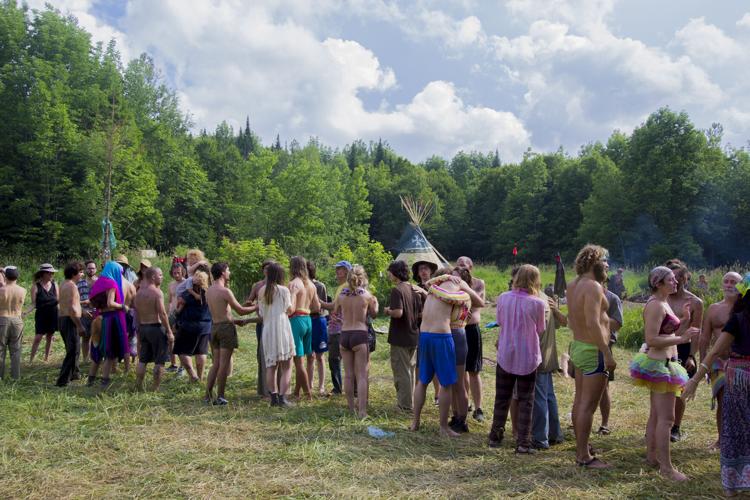
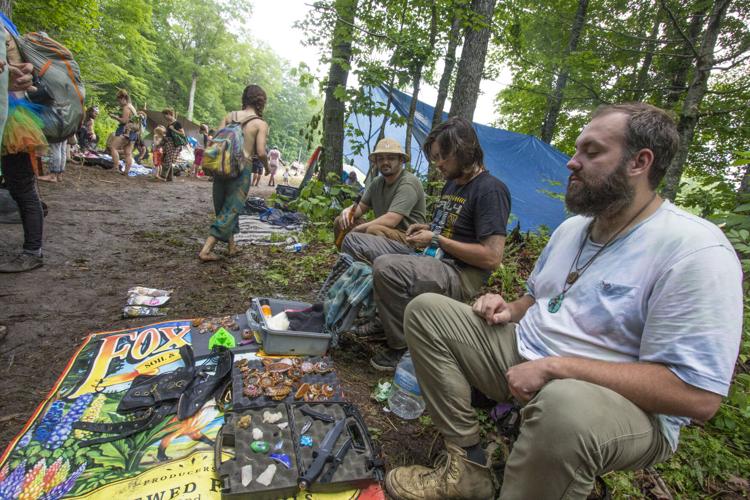
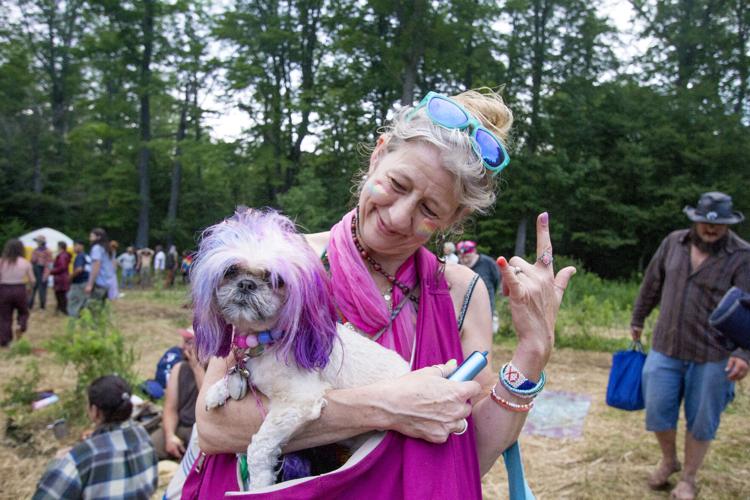
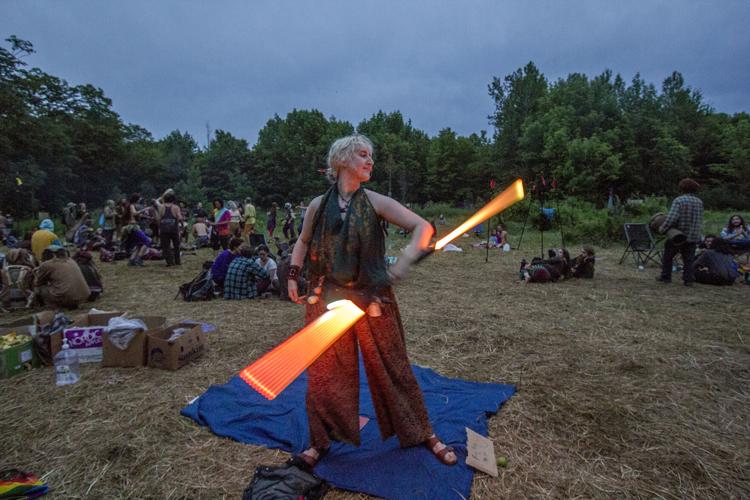
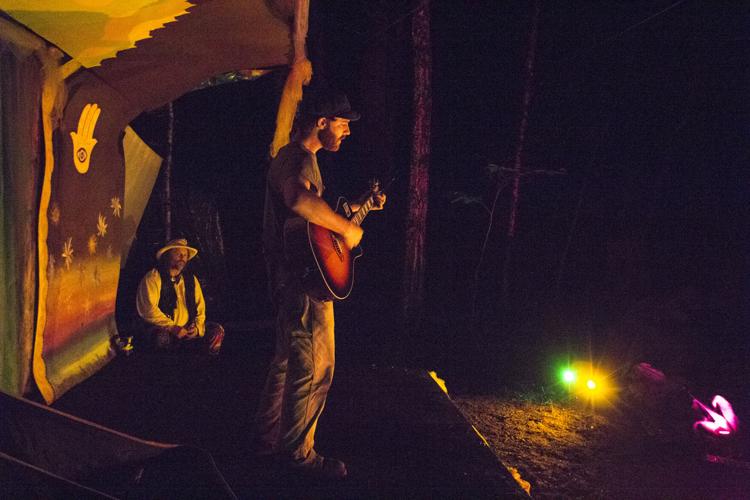











(0) comments
Welcome to the discussion.
Log In
Keep it Clean. Please avoid obscene, vulgar, lewd, racist or sexually-oriented language.
PLEASE TURN OFF YOUR CAPS LOCK.
Don't Threaten. Threats of harming another person will not be tolerated.
Be Truthful. Don't knowingly lie about anyone or anything.
Be Nice. No racism, sexism or any sort of -ism that is degrading to another person.
Be Proactive. Use the 'Report' link on each comment to let us know of abusive posts.
Share with Us. We'd love to hear eyewitness accounts, the history behind an article.